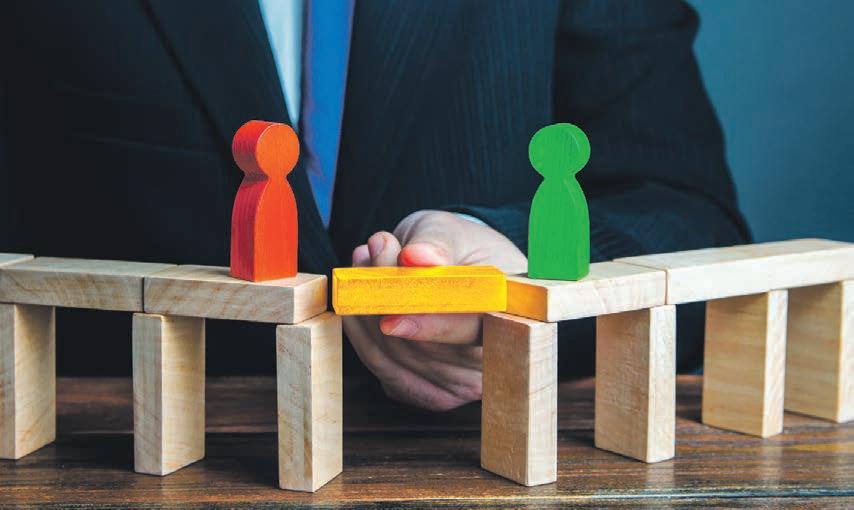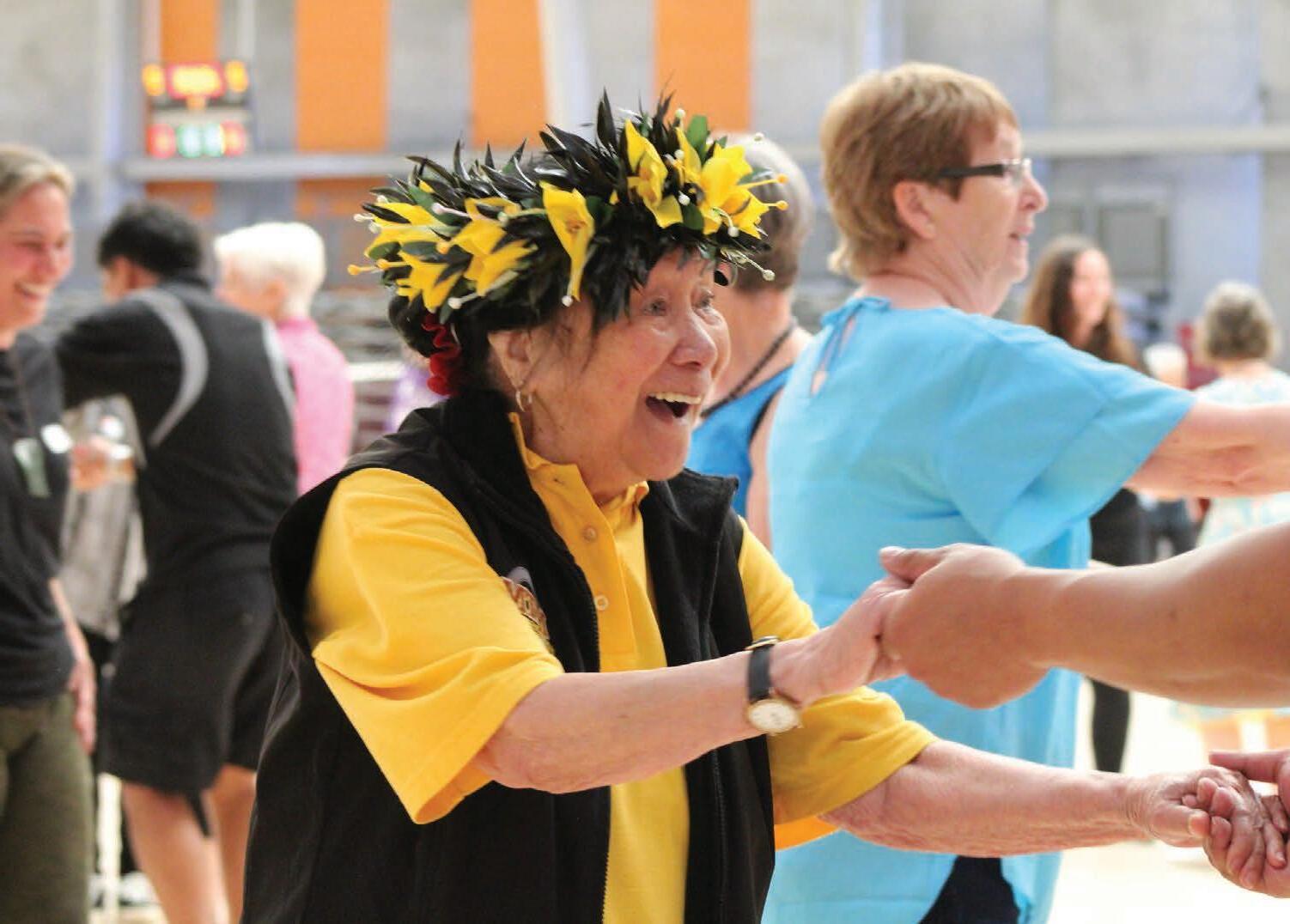
4 minute read
Relationship building blocks
entrenched, even if they are wrong, leading to an increasingly divided society.
Lifestyle
Nelson Midweek Musings
Tim
In a chapter titled ‘Charmlessness’ in The School of Life book, How To Get On With Your Colleagues, the idea of how we make assumptions about people is raised. The author suggests there are some who we assume are completely unlike us, insomuch as they don’t have many of the feelings we experience: uncertainty; worry; fear; humour… These being a few examples.
The truth is, people are a lot more like us than we think. The outwardly brash and confident person may need a reassuring word of encouragement and kindness; the quiet and standoffish person might be desperate to share in the joke around the watercooler or know about the movie you saw in the weekend.
When we start to treat others like we would like them to treat or understand us, we can build more positive relationships, whatever environment we might be in, opening us up to relationships that we may otherwise had thought were very unlikely to be developed.

Forgiveness
Podcaster Joe Rogan has clear ideas on forgiveness, feeling that the only way for a society to move on is when its members are willing to practise forgiveness, even when it becomes clear a position taken on any issue proves to be incorrect. Rogan takes this perspective for two reasons:
The reason why the [incorrect] position was taken was because of the information that was presented to them. As far as they knew, the information was correct, meaning their position was the right one to hold.
If we can’t forgive, positions will simply be
Forgiveness isn’t easy. I certainly struggle with it, but sometimes it’s the only way to move forward for the benefit of our communities.
Hard work can set you free
I’ll share this post at the risk of it sounding trite, but definitely not intending it to do so.

I heard an interview in which the guest described how she got herself out of a position in which she was struggling financially, at one stage down to her last 25 cents, the only money she had to last for two weeks when she was in college [this was some time ago, when, admittedly, 25 cents would go a lot further than it does today].
The guest shared the strategy she has used since that time to get to a place of more security, this being hard work. Regardless of where you are, hard work has the potential to move you forward.
By its very definition it’s not going to be easy, but doing something and really putting in the effort will move you forward, as uncomfortable as the hard work might be.
Writing this, I know there are so many who do work hard every day, yet are still struggling However, my advice is to keep moving forward one step at a time to get you closer to where you want to be.
Conÿ dence gained
This advice is a little different to what we usually hear about confidence. It comes from Ginni Rometti, the former CEO of IBM.
Rometti shares on the Lex Fridman podcast how she developed confidence through a three-step process; the more she studied, the more prepared she was, the more confident she became. Rometti’s process could be applied in other ways. For example, to run a marathon; the more training miles done, the more prepared you’ll be, the more confident you’ll be at the start line.
Essentially Rometti’s process is that to be confident we need to put in the hard work to be prepared.
Try turning up
Sometimes the last thing we feel like doing is turning up to something that we’re not absolutely obliged to: a party; a club night; a sports practice; a reunion; a night class. There’s so many of these things we make commitments to, but often lose motivation on the day of it happening. It can be so easy to instead spend another night on the couch watching Netflix and scrolling through your phone. What I have found is that on almost every occasion I do make that effort I enjoy it. These are the times we can enjoy the company of people we already know, as well as meeting new people. These are also occasions in which we put ourselves out of our comfort zones, often leading to the rewarding experiences that truly enrich our lives.
Don’t forget what you have Most weeks I enjoy listening to a show on
Radio New Zealand called Calling Home. It features interviews of New Zealanders who are living overseas, with the host, Jim, asking questions about their lives in their adopted countries. The latest show featured a person who is living in Lyon, France, considered one of Europe’s most liveable cities. Listening to the guest’s answers I could understand why; judging by what she shared the place seems to be wonderful. However, one thing she did say made me think about my own perspective, this being that when many in Lyon found out the guest was from New Zealand, they couldn’t understand why she wanted to live somewhere else. For anyone who is in a position to experience travelling or living overseas, this is a very fortunate position to be in. However, this doesn’t apply to everyone, especially in today’s tough economic climate. The good thing is for those of us lucky enough to be living in New Zealand is that we have a pretty amazing and enviable default option in our own beautiful country. When circumstances aren’t ideal Covid-19 had a huge impact on the lives of just about all of us. The way we did things had to change.
Lisa Carrington was ready for the 2020 Tokyo Olympics. She was in peak condition and had had a very successful four years following the Rio Olympics. However, the decision was made to postpone the Games, and, back in New Zealand, strict lockdown laws meant her training was turned upside down; she was no longer able to train outside.
Carrington’s response was to access equipment so she could at least do some training from home. One such piece of equipment was the kayak erg, a machine she hadn’t been a big fan of. However, she made the decision to adapt as best she could with what she had. This led to a period of training that turned out to be a positive one in which she made real progress. She knew others would be in the same position as her, but wouldn’t adapt. This meant she was able to use the period of time to get even stronger.
Just as Carrington did, when circumstances aren’t ideal we can still make progress through doing things a little differently. It won’t be easy, but we may not have another choice.
• Tim Nelson is principal of Lakeview School and author of the book Small Steps for a happy and purposeful life. He endeavours to learn something new every day by reading books, listening to podcasts, and engaging with a wide range of other content.










